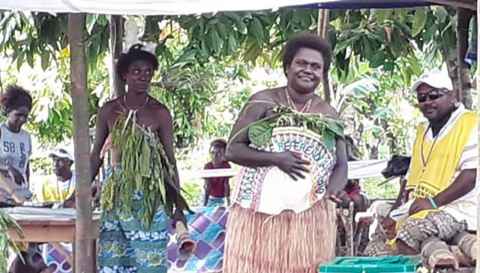The Bougainville referendum: why we should care
03 December 2019
Opinion: The Bougainville referendum could lead to a new nation. Jason Brown outlines the historical and contemporary links with New Zealand.

After a decade-long civil war and relative peace, the Autonomous Region of Bougainville is in the midst of a referendum which could determine whether they move forward as a new nation. While some will take little notice of this small region in the Pacific, there are historical and contemporary reasons why New Zealand should care.
The island of Bougainville and the accompanying smaller islands and atolls which make up the Autonomous Region of Bougainville, a province of Papua New Guinea, actually form the northernmost islands of the Solomon Islands archipelago. The island was colonised by Germany in the late 19th century, and since that time, has struggled through world wars, a parade of colonisers, conflict with the mainland, and internal strife. When Papua New Guinea was granted independence in 1975, Bougainville was included in the nation - a fact directly relevant to the referendum.
The region is rich in copper deposits, and beginning in the 1960s mining became the island’s most prominent economic activity. Conflict over the large mine at Panguna became the source of what has become known as the Bougainville “crisis” (a euphemism for the Bougainville Civil War).
Dissatisfaction over aspects of the mine resulted in disputes and violence that resulted in the Papua New Guinea Defence Force being deployed on the island. During the 1990s the situation in Bougainville descended into military action, where a blockade by the Papua New Guinea government exacerbated the internal conflict, which resulted in the loss of an estimated 15,000 lives, thousands displaced, and an immense amount of destruction still evident today.
The Bougainville conflict is extremely tangled, and entire volumes have been dedicated to disentangling all of the complexities. What is clear is that the Bougainville Peace Agreement, signed in 2001, rests on three pillars, one of which is a guaranteed referendum to determine Bougainville’s future, and where independence must be an option on the ballot.
After 18 years, that referendum is being held (23 November – 7 December). It has been delayed a few times, though extreme care is being exercised to ensure that all eligible voters are informed, and that elections are conducted according to strict international standards. The question being posed to the more than 200,000 eligible voters is whether they would like Bougainville to have greater autonomy, or whether they would opt for independence.
The tension around the referendum is palpable. Despite the two options on the ballot, any number of realistic outcomes are possible.
The tension around the referendum is palpable. Despite the two options on the ballot, any number of realistic outcomes are possible. The referendum itself is not binding, so even a vote for independence must be endorsed by the Papua New Guinea Parliament.
Given that many people have never even heard of Bougainville, why should NZ (or the rest of the world) care? There are compelling reasons.
One is that New Zealand has been intimately involved in the political development of Bougainville since the late 1990s. The Burnham Peace Talks were held in Christchurch in 1997 and a truce was signed.
In conjunction with the Australian government, New Zealand undertook Operation Bel Isi in 1998, which was intended to provide oversight around the ceasefire (the operation, and the countless courageous individuals involved, are the subject of the 2019 Will Watson documentary Soldiers Without Guns and the edited volume Peace on Bougainville). Because of this involvement and support, New Zealand was present as a witness to the signing of the Bougainville Peace Agreement.
New Zealand is also involved in contemporary Bougainville culture. The library in Arawa that serves as a cultural centre for the region was made possible by the incredible efforts of author Lloyd Jones, whose novel Mr Pip (later adapted into a film of the same name by director Andrew Adamson) is set in the Bougainville Crisis. The establishment of the library has led to the formation of the Bougainville Heritage Foundation, which has been instrumental in developing community cultural projects including our efforts to foster language and literacy.
The NZ Police also have a presence through the Bougainville Community Police Programme, with a local office in Arawa. New Zealand has also committed up to 30 unarmed police to help support the referendum efforts. For all of these reasons, Bougainvillians have a strong affinity for Kiwis.
But there are reasons that go beyond these historical and cultural connections – reasons why the rest of the world should also pay attention.
Bougainville is one of a series of island regions holding referendums on independence, including New Caledonia (2020, on the heels of a 2018 referendum) and Chuuk (2020). However, the Bougainville referendum is the result of a devastating war, and one that led to extreme factional infighting.
The larger issue is whether a small island has the economic capability to govern itself, whether that economic livelihood is necessarily contingent on mining, and whether there are opportunists in the region looking to prop up a government for strategic geographic reasons.
As the referendum continues, New Zealand can watch with optimism and hope for continued peace for this incredible, resilient region.
Jason Brown is an Associate Professor in the Cultures, Languages and Linguistics Department of the Faculty of Arts.
This article reflects the opinion of the author and not necessarily the views of the University of Auckland.
It was first published in Newsroom Why we should care about the Bougainville referendum, 3 December, 2019.
Media contact
Julianne Evans| Media adviser
Mob: 027 562 5868
Email: julianne.evans@auckland.ac.nz